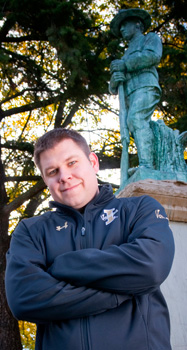Mark Olson
By Karen Hunt
 What's life like for veterans following service in a war zone?
What's life like for veterans following service in a war zone?
“It’s like you hit pause for a year, but the rest of the world didn’t,” says Mark Olson. “You come back and nobody knows [what happened], and you don’t want to tell them. Being a disabled veteran, you have to learn how to relive life."
Adjusting to life after serving in the army in Iraq is tough enough. But for veterans with permanent disabilities who have decided to return to school, every day is spent overcoming challenges that may arise.
That's where the University of Idaho's Operation Education Scholarship Program comes into the picture. But to come face-to-face with Operation Education, veterans tow a hard road.
On Sept. 11, 2001, Olson arrived at work only to learn about the collapse of the World Trade Center towers. “As I was driving home that night, I was listening to National Public Radio trying to figure out what happened,” recalls Olson.
In March 2003, Olson enlisted with the Army. Following basic training, he was sent to Fort Leonard Wood, Mo., where he spent three and a half years as a chaplain’s assistant with combat engineers, often times helping them with their work.
In 2005, Olson received orders for deployment to Iraq and two weeks before Thanksgiving, he left for Kuwait. His unit spent two weeks in Kuwait City to adjust to their new surroundings and perform nighttime exercises. Then, they pushed up north to Iraq.
“Iraq was a little terrifying,” says Olson.
Insurgents hid on roof tops and fired on American soldiers, who would then in turn fire back. Soldiers never assumed they were safe. But American soldiers were not the only people in danger. Many soldiers witnessed the harsh reality of war on Iraqis and others.
Olson helped other soldiers deal with the stress and violence through his cynical sense of humor. Along with his chaplain, he spent time getting to know the soldiers in the battalion by seeking improvised explosive devices – or IEDs. “At that point, non-essential soldiers were not supposed to be on the road,” says Olson. “But my chaplain and I felt that if we weren’t out on the road, we wouldn’t be able to relate to the other soldiers.”
Olson compares looking for bombs to looking for a needle inside a stack of needles, because everything looks exactly the same. Bombs were hidden inside items that didn’t look like bombs, which were then hidden inside something else. Explosions became an everyday occurrence, many close to Olson and the other soldiers. Due to the constant explosions, Olson lost partial hearing.
In an accident on base, Olson's humvee collided with a small pickup truck that was speeding at nearly 75 mph on wet roads. The humvee flipped and landed in the middle of a field. Olson suffered a compressed disc and torn tissue from the accident, though the extent of his injuries weren't discovered until he'd returned stateside.
In October 2006, Olson was “paroled” from Iraq. With a year and a half left to serve in the army, he spent the remaining time in physical therapy for his back and struggling with post-traumatic stress disorder.
Seeking a return to "normal" life, Olson began working at a local business. He soon realized he wanted to go back to school. Though his first choice was to attend the University of Idaho, he initially enrolled in business classes at Lewis-Clark State College. In fall 2010, he transferred to the University of Idaho, where he was told about Operation Education.
The Operation Education Scholarship Program was created in 2006 by the University of Idaho. Recognizing that veterans with disabilities returning to school will face challenges unknown to other students, the program offers customized and comprehensive academic, social and financial support to veterans with disabilities and/or their spouses.
Due to his hearing loss and other disabilities, Olson was eligible for support.
“Operation Education has single-handedly saved me,” says Olson. “I literally was down to the last $12 in the bank; I couldn’t buy books. Operation Education gave me some money to put on my Vandal Card to buy books. It was the helping hand I needed.”
In addition to books, the program has provided financial support for Olson to purchase groceries, obtain equipment to compensate for hearing loss and pay for rent. He also receives help from the university's Disabilities Student Services program to capture the verbal components of his classes.
Olson is resettling into life as a student. In addition to his business courses, he joined the Lambda Chi Alpha fraternity, which is based on the seven core values of the army. He credits his continuing success to Operation Education.
“The people that run this program are amazing,” says Olson. “Thank you to Operation Education. Thank you to my family, army buddies, friends and loving girlfriend. And thank you to everyone that donates to this program.”






